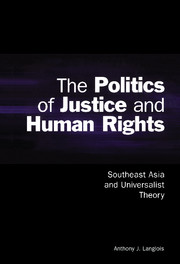Book contents
Conclusion
Published online by Cambridge University Press: 05 July 2014
Summary
Going beyond the politics of Asian values
The starting-point for this book was the political and theoretical issues that were raised by the so-called Asian values debate of the mid to late 1990s. As we saw, this debate was largely precipitated by the government leaders of countries from the Southeast Asian region who desired to legitimise their practices of ‘good governance’ in the eyes of the international community. A close examination of the positions held by the main protagonists in this debate demonstrates that the arguments used to support their claims about a set of alternative Asian values are not tenable. These arguments were advanced on cultural, economic, and state sovereignty grounds, and on their own terms are shown to be fallacious.
The debate has, however, served a useful purpose in that it raised an important question about the universality of ethical values, such as those enshrined in international human rights documents. Unfortunately, the question has not received the attention it deserves, partly because it has been dismissed on the grounds that those raising the question were clearly doing so for their own political advantage and not out of any genuine concern for the diverse human traditions lived throughout the region.
The first part of this book is offered as a contribution to the Asian values literature. Most of the literature on the debate either focuses on the contentious claims made by the region's governing elites, or it argues for the legitimacy of Western liberal values, often expressed in human rights or democratic theory terms, as a tool for the region's people to use towards their own emancipation. Rarely seen is consideration of the possibility that the people of the region find neither of these two options fully satisfactory: that, while many reject the authoritarian rule of contemporary elites, they also find the alternative that Western activists and academic commentators advocate wanting in significant respects.
- Type
- Chapter
- Information
- The Politics of Justice and Human RightsSoutheast Asia and Universalist Theory, pp. 159 - 173Publisher: Cambridge University PressPrint publication year: 2001

